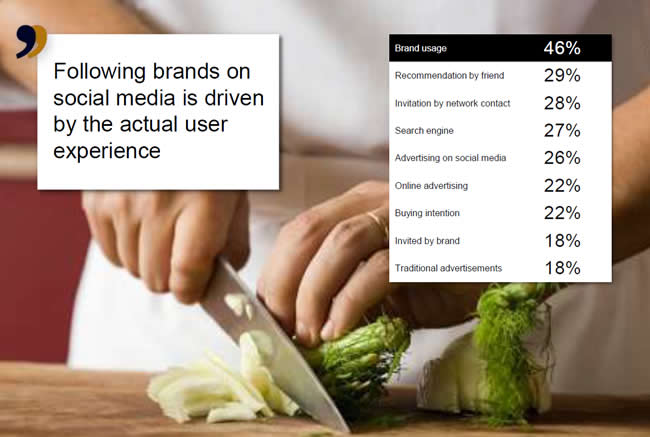If brands want an informed social media marketing strategy, it’s probably not bad to understand why people follow them on social platforms to begin with. So, the question why people follow brands on Twitter, Facebook and other social networks has been around for quite some time, occasionally leading to different answers.
Different brands obviously stand for different things and are active in a broad variety of industries. The reasons why people follow a brand that’s active in an advanced Industry 4.0 segment aren’t probably precisely the same as the reasons why consumers follow their favorite beverage brand to give a simple example. Research shows that, on top of well-known factors, the offline experience plays an important role in why people follow brands on social. It can offer marketers insights into how to enhance the social engagement strategies they have, optimize their social content marketing strategy and look at their overall ‘social approach’.

The offline experience is key for consumers to follow brands
Over the last few years, several studies have shown that people mainly start to follow brands on social media because of discounts and promotions whereby we’re mainly in the B2C space, the main area we look at here.
Once a social connection between a brand and a follower/fan is established, the continuity of it depends on your unique social proposition. In other words: what you have to offer matters most. Research by InSites Consulting, however, emphasizes the impact of that mentioned offline dimension in the reasons why people follow brands.
The study, carried out in 35 countries, shows that the reason people follow brands is first related to their offline experience with a product. They become a fan of a product on social media after having used it.
The user experience, as well as the customer experience (not the same) are essential for people to feel and have a connection with a product or brand. This is the case in general, and in a social media context. InSites Consulting claims the offline experience is much more important than, for instance, advertising campaigns (again, mainly B2C). That’s bad news for all those brands that waste tons to get “fans” on Facebook.
Obviously, there are other reasons people start to follow brands. One might simply be a buying interest. For instance, although I am a bit of an exception because of my work, I tend to follow brands or companies, which offer services or products, I am interested in for a potential future purchase or partnership.
While in my case, this following behavior usually applies to suppliers of marketing solutions, according to the research of Insites Consulting, most people follow companies in the media, fashion, food, and retail industries. This is the case in among other the US, the UK, Belgium and the Netherlands.
Regional differences in the reasons why people follow brands online
Of course, the degree in which people follow brands differs from country to country, and from region to region. The research firm established that 4 in 10 American users of social networks follow at least one brand.
networks. People are mainly focused on the direct benefit. Companies
should in first instance offer product information, update on promotions
and announce events
The European average is 5 in 10 (51% to be precise). The UK (4 in 10), Belgium (also 4 in 10) as well as the Netherlands (3 in 10) surprisingly are below that average. In the 35 countries in which the research was carried out, more than 50% of social network users appear to be connected to a brand. Within Europe, the Southern countries have most brand fans (60%), followed by Eastern-European countries. Worldwide, India scores best with 70%. The US lag as well (57%), in comparison with India, but also with China (62%) and Japan (60%).
Promotions, discounts and social media are still good friends
So what about those promotions and discounts? Is all the research that said they are the main reasons why people connect with a brand on social media wrong? Not at all. InSites Consulting showed that people will especially look for them when starting to follow a brand.
In the US and the UK 56% of the fans expect extra promotions on social media, 55% wishes to be invited for events and 50% wants to have more product information. For Belgian social network users these percentages are 46, 43 and 35% respectively.
Only the Netherlands are an exception within the countries for which I have data. There 38% of the fans wish to have event announcements, and only 33% extra promotions of the brand on social media.
Obviously, the research is response-based but, regardless of the way you look at it, social media marketing and promotions go hand in hand very well. More data and demographics about brand followers and fans in the presentation on SlideShare here, from where the illustrations originate.
Note: since the research is mainly conducted online using a rather general panel that’s representative of the online population, it’s important to remind these findings are not equally valid for all industries and sectors. For instance, in a B2B context, the reasons why people join a professional LinkedIn Group by a company, are often topic-, network- and insight-related.

